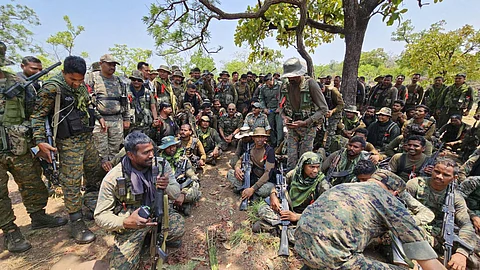

The Federation Against State Repression (FASR) – a coalition of democratic and left-leaning parties in Tamil Nadu – has called for an immediate halt to military operations against Adivasis in Chhattisgarh and demanded an independent investigation into the killing of 27 people, including senior Maoist leader Nambala Keshava Rao alias Basavaraj.
The call came during a press conference on Thursday, May 29, in response to the Union government’s ongoing counter-insurgency campaign, Operation Black Forest, which aims to eliminate Maoism by March 2026. The FASR said the operation has led to widespread violence and a mounting death toll, which it claimed has reached approximately 350 people across India.
Representatives from organisations including the People’s Union for Civil Liberties (PUCL), the Welfare Party, and the Tamilaga Vazhvurimai Katchi were present at the conference, which strongly condemned what it described as a “genocidal war on the Adivasis of Bastar.”
Aranga Gunasekharan, state coordinator of FASR, described Operation Kagar as the latest in a series of long-running anti-tribal state policies. Citing previous state-led actions such as Operation Green Hunt and the formation of Salwa Judum — a controversial government-backed militia accused of widespread human rights violations — Gunasekharan said these actions reflect a war that has been waged against Adivasi communities for the past two decades.
“The Government of India’s current operation is part of a continued policy of repression and displacement of tribal communities to pave the way for corporate plunder,” he said.
The FASR also condemned the killing of Basavaraj and 26 others during a military operation, drawing stark parallels between India’s internal security tactics and international human rights abuses. Thozhar Thyagu, leader of the Tamil Nadu Liberation Movement, likened the killings to the state violence in Gaza and Sri Lanka.
“There is no difference between the present actions of the state and the violence of Israel on Gaza or the violence propagated on the Tamils of Sri Lanka,” Thyagu said.
The conference strongly objected to the cremation of the bodies of those killed in Chhattisgarh without handing them over to their families — an act carried out despite court orders. On Tuesday, May 27, all 27 bodies, including that of Basavaraj, were reportedly cremated in an Adivasi burial ground in Narayanpur, Chhattisgarh, even as families demanded their return.
According to the press note released by FASR, between January 1 and May 29, 2024, at least 520–550 Adivasis have been killed during armed operations. Of these, 215–225 were identified as non-combatants, including six-month-old Mangli Sodi, several children under 12, and one deaf-mute adolescent girl.
The note also raised alarm over the construction of four to six-lane highways through tribal regions in central India, alleging that these infrastructure projects are not for the benefit of Adivasi communities, but rather to facilitate access for private mining giants such as Vedanta and Adani.
Chhattisgarh, which holds 19% of India’s total mineral reserves and 36% of its tin reserves, plays a key role in the country’s mining economy. The state also contains rich deposits of lime, dolomite, and bauxite, and accounts for 15% of all mineral extraction in India. According to the Ministry of Mines’ 2022 Bulletin of Mining Leases, 175 mines were approved in Chhattisgarh, of which 141 were allotted to private companies.
The FASR criticised the 2023 amendment to the Mines and Minerals (Development and Regulation) Act, 1957, which allows the Union government to directly allocate exploration licenses, arguing it centralises power and undermines tribal consent.
“Post-liberalisation, the Government of Chhattisgarh has signed thousands of secret MoUs with multinational corporations for mineral extraction. These agreements have largely remained unimplemented due to the fierce resistance by Adivasi communities,” the statement said.
Gunasekharan condemned the mainstream media’s role in normalising violence, accusing it of reducing death tolls to spectacle. “The state is celebrating the killing of its own citizens while the press is announcing death counts as if they were cricket scores,” he said.
The FASR reiterated its demand for an independent inquiry into the killings, an end to armed operations in tribal regions, and greater transparency in state-corporate agreements concerning mineral resources.